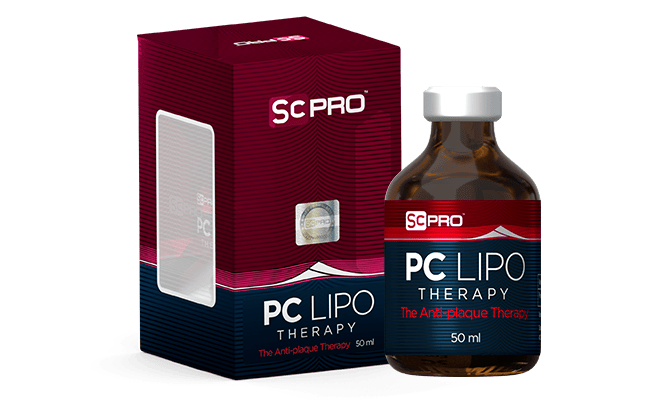
Its ingredient, Phosphatidylcholine, offers major benefits to overall health, including helping to maintain healthy cholesterol level, improving and supporting cellular membrane fluidity and stability, and preventing dysfunction in various organs.
Phosphatidylcholine, which was claimed to be the “mother-substance-of-all” by famed pharmacologist Oscar Liebreich and is now known as a crucial phospholipid that makes up cell membrane.
It is responsible for many roles including:
- As a component of cell membrane, which adds fluidity and promotes the stability and function of transmembrane proteins
- Antioxidant, cytoprotective and fluid-regulating effects
- As an integral component of the lipoproteins, especially HDL, which are involved in the transport of cholesterol from the arterial walls to the liver for processing
- As a major constituent of bile, which is important for lipid metabolisation
- Helping to packages cholesterol and triglycerides into very-low-density lipoprotein (VLDL)
- Cholesterol transport and degradation
- Helping to maintain healthy blood cholesterol and triglyceride levels
- Reducing visceral fat
Since phosphatidylcholine make up about 65% of cell membranes in the body, they are crucial to its fluidity and stability. In fact, deficiency of phosphatidylcholine can cause major problems including increasing the cell membrane’s susceptibility to oxidative stress and damage and causing possible dysfunction to parts of the body such as the brain, digestive tract, and liver.
PHOSPHATIDYLCHOLINE
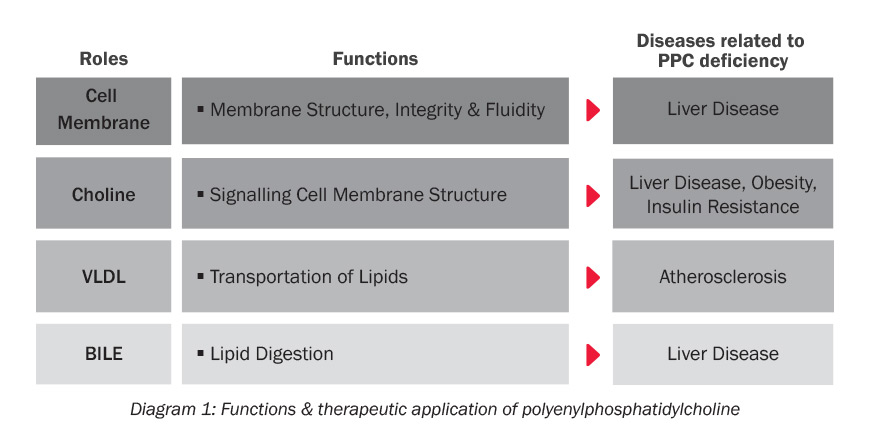
Cell membrane (or plasma membrane) provides the barrier between the interior of the cell and its surroundings. Phosphatidylcholine is an important phospholipid and major constituent of cell membranes, providing integrity and structure in addition to helping regulate fluidity for nutrients and oxygen transport. It is also a major component of the surfactant in the lungs and the mucus in human guts.
The selectively permeable property of cell membrane allows it to regulate the cell’s intake or expelling of nutrients and waste. If this cell membrane’s integrity is somehow compromised, it will not be able to perform this crucial task, leading to serious dysfunctions in the cell.
The structural integrity and proper functioning of cell membranes are important for normal cellular homeostasis as well as the replication and organization of cells. Chemical and physical changes to these membranes can lead to pathological symptoms such as metabolic diseases (e.g. hypercholesterolaemia, diabetes, obesity, and atherosclerosis) and the decline of cognitive functions (e.g. Alzheimer’s disease). These changes can occur through cellular injury. Supplementing the body with Phosphatidylcholine helps to restore these damaged cellular membranes.
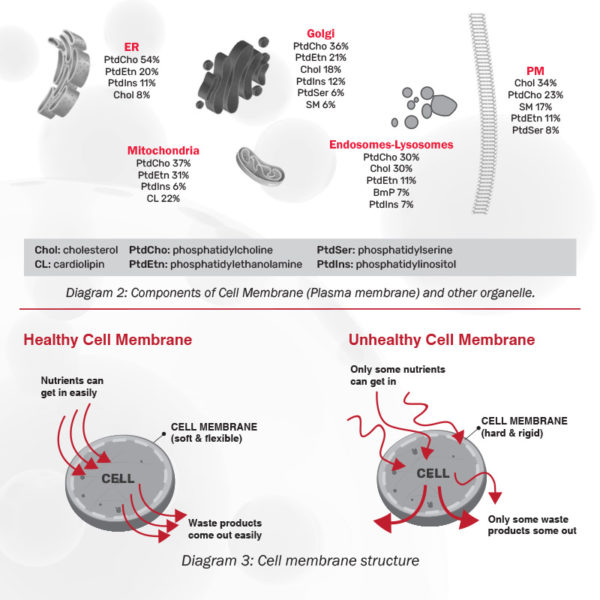
Phosphatidylcholine also affects the intestinal phase of lipid metabolism. A high intake of Phosphatidylcholine interferes with intestinal cholesterol absorption (due to it being highly reliant on the amount of phospholipids in gut lumen) – long-term supplementation can result in reduced absorption of cholesterol and circulating cholesterol in the system.
This works because by supplementing the body with additional Phosphatidylcholine, it receives a surplus of phospholipids that alter the physiochemical properties of mixed micelles and induce a shift of cholesterol molecules from the micellar phase to the lamellar phase, where cholesterol is poorly absorbed.
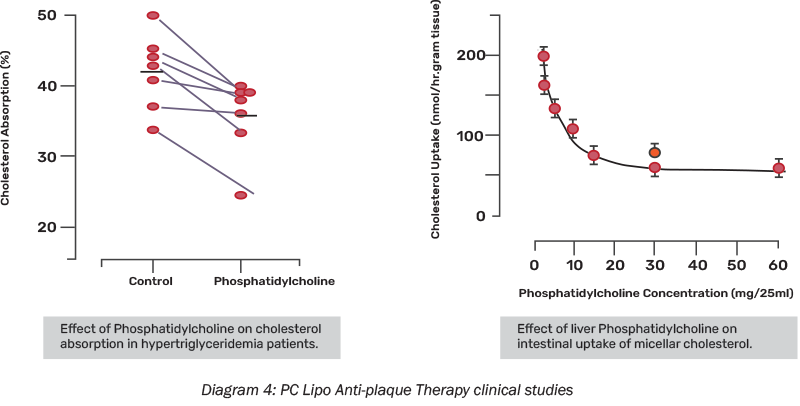
The human liver is susceptible to various exogenous substances that can cause its detoxication enzymes to produce metabolites that are harmful to liver tissue. Common exogenous factors include alcohol, sugar, saturated fat, certain medication, and pollutants.
The parenchymal cells, the functional tissue of liver (hepatocytes) is reliant on the cell membranes, which is composed by 65% Phosphatidylcholine. Administration of Phosphatidylcholine shows the following liver protective effects:
- Reduced serum activities of liver enzyme markers released by liver tissue
- Reduce risk of NAFLD by lessening the lipid peroxidation triggered by free radical and oxidative insult
- Decelerated membrane damage, protected membrane integrity
- Diminished cell death, fibrosis, and fatty infiltration of the liver tissue
- Increased cell synthesis of RNA and protein, suggesting liver tissue regeneration
- Improved liver metabolism
Phosphatidylcholine also plays an essential role in lipid transportation and metabolism. This helps with addressing certain diseases such as fatty liver disease, which occurs when there is an accumulation of hepatic triglycerides that induce a variety of metabolic injuries, promote inflammation, and eventually, lead to liver failure.
High consumption of alcohol can lead to fatty liver, as alcohol increases the Phosphatidylcholine requirement, inducing a state of relative deficiency when the diet is low in lipotropic activity. This slows down fat transport. A deficiency of Phosphatidylcholine is associated with accumulation of hepatic liquid, organ dysfunction, spontaneous fatty liver, and liver cell apoptosis.
Phosphatidylcholine is also capable of improving liver detoxification – it is one of the major lipotropic agents, affecting primarily the mitochondria and large granules in the liver cell.
Finally, Phosphatidylcholine helps to regulate VLDL secretion. It favours the formation of very low density lipoprotein (VLDL), which is an effective vehicle to transport the lipids away from the liver to capillary beds in adipose tissue and organs. Here, the lipids are hydrolysed, providing fatty acids that can be oxidised to produce adenosine triphosphate for energy production.
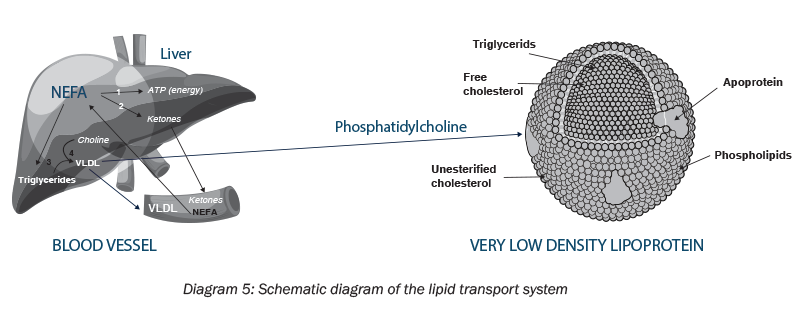
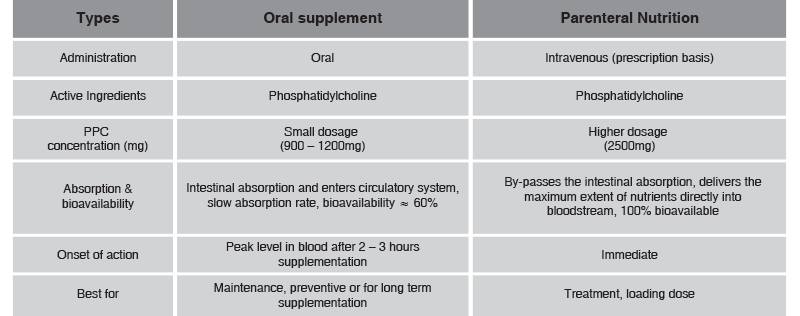
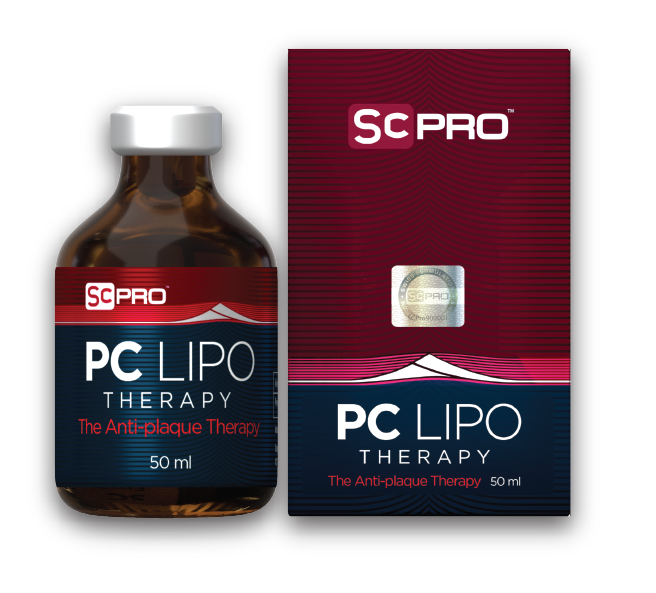
INGREDIENTS
50ml contains 2500mg Phosphatidylcholine (derived from Soy)
STORAGE
Storage (°C): 4°C – 16°C, away from direct sunlight
SHELF LIFE
4 years
PRECAUTIONS
Used in caution in patients with:
- Low blood pressure
- Diarrhea problem
- Allergy to soy-based ingredients
- Chronic Kidney Disease
- Bleeding abnormalities or currently being treated with anti-platelet or anticoagulant therapy
Avoid co-administration with other drugs that cause hypokalaemia such as corticosteroids, digoxin, etc.
GENERAL PROTOCOL
INFUSION PREPARATION:
Diluent: 250ml – 500ml 5% Glucose or Dextrose (D5W).
General Dosage schedule:
< 60kg body weight, 25ml PC LIPO THERAPY
> 60kg body weight, start with 25ml PC LIPO THERAPY and observe for 30 minutes, should there’s no adverse reaction, add another 25ml
PC LIPO THERAPY
*The final concentration used for treatment depends on the doctor’s prescription.
Length of the infusion:
Please allow 90 – 120 minutes infusion time, do not opt for a rapid infusion as it may cause a sudden drop in blood pressure
CONTRAINDICATIONS
- PC LIPO THERAPY solution cannot be mixed with any other solutions and infusions other than 5% glucose or dextrose
- Avoid rapid intravenous infusion
